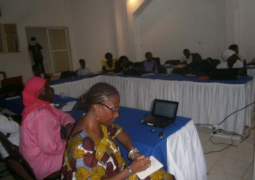Recently Sheraton Hotel lost an appeal at the high court in Banjul filed by hotel lawyer Ida Drammeh, following a judgment delivered by former Magistrate Kayode of the Kanifing Magistrates’ Court in favour of Bakary Bojang, plaintiff.
The appeal case was presided over by Justice Amadi.
Former Magistrate Kayode awarded the plaintiff D19, 600 for loss of earnings for seven months, and damages for breach of a fixed contract.
He also awarded the plaintiff D25, 000 for breach of contract and trust, and 21 percent interest from the date of termination of the contract to date of judgment.
Another 4 percent interest from the date of judgment up to the date of final settlement of judgment was also awarded to the plaintiff.
The grounds of appeal by Sheraton Hotel indicated that the defendant has been denied a right to be heard and fair hearing guaranteed by the constitution of The Gambia.
The defendant added that the Kanifing Industrial Tribunal did not have the jurisdiction to hear the case.
Sheraton Hotel went on to state that the matter before the Kanifing Industrial Tribunal was incompetent as it was not properly constituted with respect to the parties.
Still on the grounds of appeal, the defendant stated that Rule 10 of the Labour Act was not complied with by the tribunal prior to its entering upon the hearing in the suit.
Sheraton Hotel further stated that the claim by the plaintiff did not contain any proper prayers or claim and did not disclose in any event a proper cause of action.
That the damages awarded to the plaintiff were excessive, and not in accordance with the applicable law or the terms of the agreement between the parties.
Sheraton Hotel adduced that the judgment was against the weight of the evidence, and that the decision of the tribunal was otherwise erroneous.
Lawyer Edrisa Sissoho, who represented the plaintiff, Bakary Bojang, at the high court challenged the appeal.
He stated in his brief that it was the duty of an appellant to demonstrate that a judgment was faulty based on an error of law or fact as per what transpired on the record.
He argued that it was on record that a representative of the appellant by the name of Kevin Linder was recorded by the tribunal three times as present when the matter was mentioned, adding that if the appellant chose not to attend further proceedings after being aware of the case against them, then they had no cause for complaint if the matter proceeded in their absence.
He submitted that the appellant had failed to show the limits of the jurisdiction of the Industrial Tribunal.
He further argued that it was too late in the day for the appellant to complain that there was no proper party before the tribunal.
“I submit that the issue regarding a party is that such a party to a case must be properly identified, and in this case there was no doubt as to the identity of the party that the respondent wanted to sue,” he argued.
He urged the high court to dismiss the appeal with cost.
In summary, Justice Amadi stated in his judgment of the appeal that technicalities should not be used to defeat justice. He stated that the grounds of appeal filed by the appellant lacked merit.
He maintained the award of D19, 600 awarded by the Industrial Tribunal to the plaintiff for loss of earnings for seven months, and also D46.66 for 14 days paid holidays for the plaintiff.
The 21 percent interest from the date of termination of the contract to the date of judgment was upheld by the high court in favour of the plaintiff, and 4 percent interest thereafter from the date of judgment up to date of payment.
Sheraton Hotel lost all their grounds of appeal.



